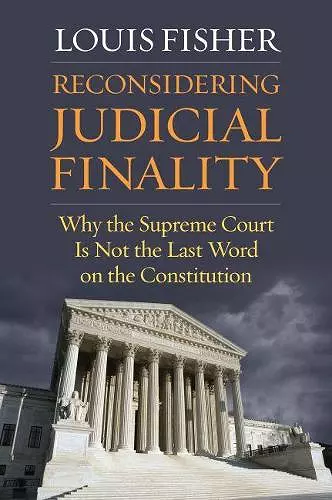Reconsidering Judicial Finality
Why the Supreme Court Is Not the Last Word on the Constitution
Format:Hardback
Publisher:University Press of Kansas
Published:30th Aug '19
Should be back in stock very soon

Federal judges, legal scholars, pundits, and reporters frequently describe the Supreme Court as the final word on the meaning of the Constitution. The historical record presents an entirely different picture. A close and revealing reading of that record, from 1789 to the present day, Reconsidering Judicial Finality reminds us of the “unalterable fact,” as Chief Justice Rehnquist once remarked, “that our judicial system, like the human beings who administer it, is fallible.” And a Court inevitably prone to miscalculation and error, as this book clearly demonstrates, cannot have the incontrovertible last word on constitutional questions.
In this deeply researched, sharply reasoned work of legal myth-busting, constitutional scholar Louis Fisher explains how constitutional disputes are Settled by all three branches of government, and by the general public, with the Supreme Court often playing a secondary role. The Court’s decisions have, of course, been challenged and reversed in numerous cases—involving slavery, civil rights, child labor legislation, Japanese internment during World War II, abortion, and religious liberty. What Fisher shows us on a case-by-case basis is how the elected branches, scholars, and American public regularly press policies contrary to Court rulings—and regularly prevail, although the process might sometimes take decades. From the common misreading of Marbury v. Madison, to the mistaken understanding of the Supreme Court as the trusted guardian of individual rights, to the questionable assumptions of the Court's decision in Citizens United, Fisher’s work charts the distance and the difference between the Court as the ultimate arbiter in constitutional matters and the judgment of history.
The verdict of Reconsidering Judicial Finality is clear: to treat the Supreme Court’s nine justices as democracy’s last hope or as dangerous activists undermining democracy is to vest them with undue significance. The Constitution belongs to all three branches of government—and, finally, to the American people.
In a field crowded with book-length studies of judicial review and the finality of Supreme Court decisions, Louis Fisher has something new and important to say. In Reconsidering Judicial Finality he demonstrates that judicial review is not the only means by which the meaning of the Constitution can by ascertained, and that the Court is not always the final authority on the meaning of the law. Fisher’s account of the ways in which Court finality has been contested will prove attractive to general readers and to scholars of constitutional law, legal history, and American politics." - Peter Charles Hoffer, coauthor of The Supreme Court: An Essential History, Second Edition
"For the same reasons that it distributes substantive governmental power across multiple federal and state institutions, the US Constitution also divides interpretative power across institutions; Congress, the president, the states, and the people all contribute to the development of constitutional law along with the Supreme Court. In Reconsidering Judicial Finality: Why the Supreme Court Is Not the Last Word on the Constitution, Louis Fisher, with his characteristic sweep and erudition, shows how all institutions of government engage in the enterprise of constitutional interpretation-and how they do so with widely varying skill and results that do not always reflect well on the federal courts. Covering more than two centuries of practice across a dozen different topics, this book should help put an end to the strangely enduring myth of judicial supremacy in constitutional interpretation." - Gary Lawson, coauthor of “A Great Power of Attorney”: Understanding the Fiduciary Constitution
"Louis Fisher’s most recent book provides a characteristically thorough and thoughtful argument for the shared nature of constitutional interpretation. In heated political times, Reconsidering Judicial Finality serves as a valuable reminder that American constitutionalism is and has been a collective effort fueled not only by the Supreme Court but also by the political branches and, more often than typically understood, by the people themselves." - Louis J. Virelli III, author of Disqualifying the High Court: Supreme Court Recusal and the Constitution
ISBN: 9780700628100
Dimensions: 236mm x 160mm x 22mm
Weight: 595g
288 pages